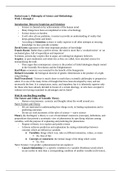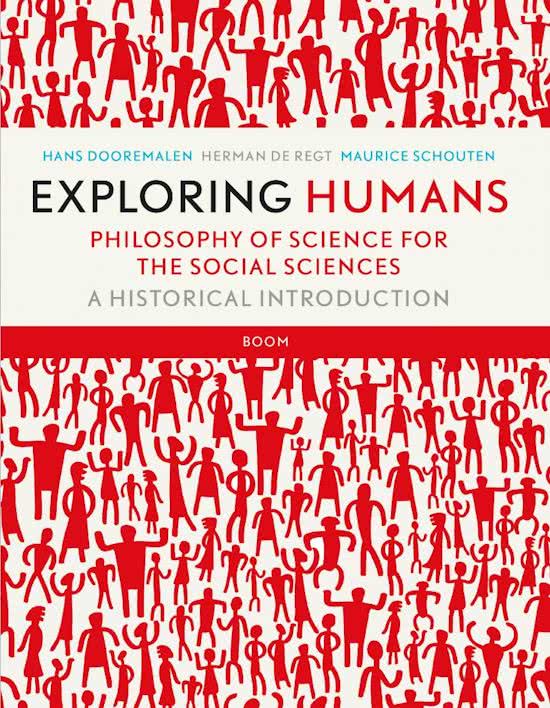Partial exam 1: Philosophy of Science and Methodology
Week 1 through 4
Introduction: Between Scepticism and Scientism
- Science is cheered on by achievements of the human mind
- Many things have been accomplished in terms of technology
- Science knows no borders
- It will solve all our problems, it seems to provide an understanding of reality that
keeps getting better and better.
- According to Scientism: science is vastly superior to all other attempts at securing
knowledge: its laws provide certainty
David Gross: ignorance is the most important product of knowledge
Francis Bacon: Rather than a perfect mirror, the mind is more like a ‘crooked mirror’ or ‘an
enchanted glass, full of superstition and imposture’
Scientists, present-day sceptics like to argue, are nothing but dogmatic believers
Sceptics: or post-modernists and relativists as they are called, have attacked science for
monopolising the truth.
- They argue that contemporary science is the product of failed ideologies deeply rooted
in the Scientific Revolution and the Enlightenment
Karl Marx: economics was invented for the benefit of the bourgeoisie
Richard Lewontin: the biological doctrine of genetic determinism is the product of a right-
wing ideology
Paul Feyerabend: ‘Science is much closer to myth than a scientific philosophy is prepared to
admit. It is one of the many forms of thought that have been developed by man, and not
necessarily the best. It is conspicuous, noisy, and impudent, but it is inherently superior only
for those who have already decided in favour of a certain ideology, or who have accepted it
without ever having examined its advantages and its limits”
Watt & van den Berg reading
The Nature and Utility of Scientific Theory
- Human consciousness: curiosity and thoughts about the world around you
Naïve Science and Theory
- We are interested in understanding how things work, in finding explanations and in
predicting outcomes
- Do not act with awareness of the rules of science -> naïve science
Theory (by Kerlinger): a theory is a set of interrelated constructs (concepts), definitions, and
propositions that present a systematic view of phenomena by specifying relations among
variables, with the purpose of explaining and predicting the phenomena
- Purpose of theory is to explain and predict events
- A theory achieves prediction and explanation by stating relationships between
concepts which are defined as variables
o Variables: things which vary, take on different intensities, values, or states
Ex. Size of fire
o Concepts or constructs: the mental image of the thing which varies
Ex. Fire
Naïve Science: Can predict a phenomenon but not explain it
- Causal relationship: it’s a specific condition of a variable (Northeast wind) which
occurs earlier in time than a corresponding condition of another variable (cold water) ,
, combined with some reasonable explanation for the relationship between these two
variables (the nature of the geography of the region)
Naïve Inquiry versus Scientific Method
- Thing which differentiates between science and naïve inquiry is the awareness that our
observations and reasoning are error-prone, and that we must employ strategies that
help us guard against committing error
5 points that emphasize on which science and naïve inquiry differ by Kerlinger
The Development of Theories
- A theory is a set of two or more concepts interrelated by one or more hypothetical
propositions
- Scientist
o systematically selects all the concepts that are possible causes of a phenomena
o eliminate from the theory all other concepts considered to be irrelevant
o relies on previous work of others to justify using the concepts, and to explain
the cause-effect sequence in their relationship
- The Naïve Scientist
o Does not go through the process of systematically reviewing the work of
others, and of considering alternative concepts
o Select a concepts as a cause simply because he finds it to be appealing
o Would like it to be the cause
o Base their explanation of phenomena on their own observation of reality
o Select concepts based on their appeal rather than their relevance
The Testing of Theories
- Naïve science and science differ in their demand for evidence which supports the truth
of a theory
- Naïve scientist
o Be satisfied that his theory is correct because its truth is obvious and conclude
that no further support is needed
o Theory is thought to be correct because it is ‘self-evident’, ‘common sense’, ‘is
what any reasonable person would conclude
- Scientist
o Insists on obtaining objective evidence before making judgments about the
probable truth or falsehood or the theory
Objective: the evidence can be collected by any other person (evidence
is reproducible), and that it is not biased toward providing the theory
either true or false
o Aware of the human tendency toward the selective use of evidence and will try
mightily to guard against preconceptions or biases affecting his or her research
Giving alternative explanations of the phenomenon
o Publishes research procedures, so that unconscious bias can be detected
- Three key ideas to remember:
o Theories must be tested objectively, rather than assumed to be true or false
o All information must be considered on an equal basis, rather than selected just
to support the theory
o Testing of theories must be done under conditions which will minimize the
possibility of conscious or unconscious subjective biases of the researcher
Control of Alternative Explanations
- Naïve scientist






